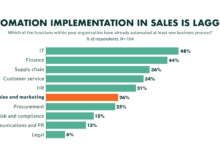Top Cloud-Based CRM Platforms
Top Cloud-Based CRM Platforms are transforming how businesses manage customer relationships. This exploration delves into the leading platforms, comparing their features, pricing, and suitability for various business sizes. We’ll examine the benefits of cloud-based solutions over on-premise systems, explore key functionalities like contact management and marketing automation, and address crucial aspects like security and data management. Ultimately, we aim to equip you with the knowledge to choose the CRM platform best suited to your specific needs.
From small startups to large enterprises, selecting the right Customer Relationship Management (CRM) system is paramount for success. This guide provides a comprehensive overview of the top cloud-based CRM platforms, offering a comparative analysis to help businesses make informed decisions. We’ll cover critical aspects like pricing models, integration capabilities, and security protocols, ensuring you understand the nuances of each platform before making a commitment.
Introduction to Cloud-Based CRM Platforms
Cloud-based Customer Relationship Management (CRM) platforms have revolutionized how businesses manage interactions with customers. They offer a flexible and scalable solution for managing customer data, automating processes, and improving overall customer experience. This section delves into the core aspects of cloud-based CRM platforms, outlining their key features, benefits, deployment models, and comparing popular options.
Definition and Key Features of Cloud-Based CRM Platforms
Cloud-based CRM platforms are software applications that manage and analyze customer interaction and data throughout the customer lifecycle. Unlike on-premise systems, which reside on a company’s internal servers, cloud-based CRMs are hosted on remote servers and accessed via the internet. Key features typically include contact management, sales force automation, marketing automation, customer service tools, reporting and analytics, and integration capabilities with other business applications. These features enable businesses to centralize customer information, streamline workflows, and gain valuable insights into customer behavior.
Benefits of Cloud-Based CRM Systems Over On-Premise Solutions
Cloud-based CRMs offer several advantages over traditional on-premise systems. Cost savings are significant, eliminating the need for expensive hardware, software licenses, and IT infrastructure maintenance. Scalability is another key benefit; cloud-based systems can easily adapt to changing business needs, allowing businesses to scale up or down as required without significant investment. Accessibility is enhanced, with employees able to access CRM data from anywhere with an internet connection, improving collaboration and productivity. Finally, cloud-based systems often receive automatic updates and security patches, reducing the burden on IT staff and improving overall security.
Types of Cloud-Based CRM Deployments
Cloud-based CRM deployments come in various models, each catering to different needs and security requirements. Public cloud deployments involve sharing resources across multiple tenants, offering cost-effectiveness and ease of use. Private cloud deployments offer greater control and security, with resources dedicated solely to a single organization. Hybrid cloud deployments combine aspects of both public and private clouds, allowing organizations to leverage the benefits of both models. The choice of deployment model depends on factors such as budget, security requirements, and the organization’s IT infrastructure.
Comparison of Popular Cloud-Based CRM Platforms
The following table compares three popular cloud-based CRM platforms: Salesforce Sales Cloud, Microsoft Dynamics 365, and HubSpot CRM. These platforms are widely used across various industries and offer a range of features to support business growth.
| Feature | Salesforce Sales Cloud | Microsoft Dynamics 365 | HubSpot CRM |
|---|---|---|---|
| Pricing | Subscription-based, various plans | Subscription-based, various plans | Freemium model, paid plans available |
| Customization | Highly customizable through AppExchange | Customizable through extensions and integrations | Good level of customization, but less extensive than Salesforce or Dynamics 365 |
| Integration | Extensive integration capabilities | Strong integration capabilities with Microsoft products | Integrates well with various marketing and sales tools |
| Reporting & Analytics | Robust reporting and analytics dashboards | Comprehensive reporting and analytics features | User-friendly reporting and analytics tools |
Top Cloud-Based CRM Platforms
Choosing the right cloud-based CRM can significantly impact a business’s efficiency and growth. This section provides a comparative overview of three leading platforms: Salesforce, Microsoft Dynamics 365, and HubSpot CRM, focusing on their pricing, features, scalability, target audiences, and strengths and weaknesses.
Salesforce, Microsoft Dynamics 365, and HubSpot CRM: A Feature Comparison
These three platforms represent different approaches to CRM management, catering to diverse business needs and sizes. Salesforce is known for its extensive features and enterprise-level capabilities, while Microsoft Dynamics 365 integrates seamlessly with the Microsoft ecosystem. HubSpot CRM emphasizes marketing automation and sales funnel management, often appealing to smaller businesses and startups. Pricing models vary significantly, with options ranging from affordable starter plans to highly customized enterprise solutions. Scalability is a key factor, allowing businesses to adapt their CRM as their needs evolve.
Pricing Models and Scalability
Salesforce offers a tiered pricing structure, with its Sales Cloud starting at a relatively high price point, reflecting its advanced features. Microsoft Dynamics 365 also utilizes a tiered system, offering various modules (Sales, Customer Service, Marketing, etc.) that can be combined to create a customized solution. Pricing is generally competitive with Salesforce, though specific costs depend on the modules selected and the number of users. HubSpot CRM boasts a freemium model, offering a basic version for free, with paid options unlocking advanced features and increased user capacity. All three platforms offer scalable solutions, capable of handling growth from small businesses to large enterprises. However, the cost of scaling can be substantial for Salesforce and Dynamics 365, especially as user numbers and required features increase. HubSpot’s scalability is generally more cost-effective for businesses experiencing moderate growth.
Target Audience and Strengths
Salesforce’s comprehensive features and robust integrations make it ideal for large enterprises with complex sales processes and a need for extensive customization. Its strength lies in its powerful automation capabilities and extensive app ecosystem. Microsoft Dynamics 365 excels in organizations already heavily invested in the Microsoft ecosystem, providing seamless integration with other Microsoft products like Outlook and SharePoint. Its strength lies in its ease of use for users familiar with the Microsoft interface. HubSpot CRM is a strong choice for small and medium-sized businesses (SMBs) and marketing-focused organizations. Its user-friendly interface and built-in marketing automation tools make it a powerful yet accessible solution. Its strength is its ease of implementation and its comprehensive marketing features.
Weaknesses and User Feedback
Salesforce, while powerful, can be complex and expensive, potentially leading to a steep learning curve for users. User reviews often highlight the cost as a significant drawback, along with the complexity of customization. Microsoft Dynamics 365, while integrating well with the Microsoft ecosystem, may lack the customization options of Salesforce, potentially limiting its flexibility for businesses with unique needs. Some users report that certain modules can feel somewhat siloed. HubSpot CRM, while user-friendly, may lack the advanced features and scalability of Salesforce and Dynamics 365 for larger enterprises. User reviews sometimes point to limitations in its reporting and analytics capabilities compared to its competitors.
Comparative Summary
| Feature | Salesforce | Microsoft Dynamics 365 | HubSpot CRM |
|---|---|---|---|
| Pricing | High, tiered pricing | Tiered pricing, competitive with Salesforce | Freemium model, scalable pricing |
| Features | Extensive, highly customizable | Comprehensive, integrates well with Microsoft ecosystem | User-friendly, strong marketing automation |
| Scalability | Highly scalable, but expensive to scale | Scalable, cost depends on modules | Cost-effective scalability for moderate growth |
| Target Audience | Large enterprises | Organizations using Microsoft products | SMBs, marketing-focused businesses |
| Strengths | Powerful automation, extensive app ecosystem | Seamless Microsoft integration, ease of use | User-friendly, strong marketing features |
| Weaknesses | High cost, complex to learn | Limited customization, potential module siloing | Limited advanced features for large enterprises |
Key Features and Functionality of Leading Platforms
Choosing the right cloud-based CRM depends heavily on understanding the core features and functionalities offered by leading platforms. The best platform for your business will depend on your specific needs and priorities, but a strong understanding of common features allows for informed decision-making. This section details key features across several popular CRM systems.
Contact Management Capabilities
Effective contact management is fundamental to any CRM. Leading platforms offer robust tools to efficiently store, organize, and interact with customer data. This includes features that go beyond simple contact lists, incorporating advanced functionalities for improved customer relationship management.
- Salesforce: Offers detailed contact profiles with customizable fields, allowing for comprehensive data capture and segmentation. It integrates seamlessly with other Salesforce products for a holistic view of the customer journey. Advanced features include contact relationship management, identifying connections between individuals within an organization.
- HubSpot: Provides a user-friendly interface for managing contacts, with features like contact properties, company associations, and lifecycle stages. Its robust contact management system helps segment audiences for targeted marketing campaigns.
- Microsoft Dynamics 365: Boasts a strong contact management system integrated with other Microsoft products. It allows for detailed contact profiles, interaction tracking, and segmentation for targeted communication.
Sales Force Automation Features
Sales force automation (SFA) tools streamline sales processes, boosting efficiency and productivity. Top CRMs offer a range of SFA capabilities to manage leads, track opportunities, and automate repetitive tasks.
- Salesforce: Provides tools for lead management, opportunity tracking, forecasting, and sales reporting. Its advanced features include sales process automation, allowing for customized workflows and automated tasks.
- HubSpot: Offers features like deal pipelines, contact scoring, and sales activity tracking. Its intuitive interface makes it easy to manage the entire sales process, from initial contact to closing the deal.
- Microsoft Dynamics 365: Includes sales pipeline management, opportunity tracking, and forecasting capabilities. It integrates with other Microsoft tools, enhancing collaboration and data accessibility.
Marketing Automation Tools
Effective marketing automation tools allow for targeted campaigns, personalized messaging, and improved customer engagement. Leading CRMs provide a range of features to automate marketing tasks and analyze campaign performance.
- HubSpot: Is particularly strong in marketing automation, offering features like email marketing, landing page creation, workflow automation, and analytics dashboards. Its capabilities allow for highly targeted and personalized marketing campaigns.
- Salesforce Marketing Cloud: A dedicated marketing automation platform integrated with Salesforce CRM, providing advanced features like journey builder, audience segmentation, and email personalization at scale. It offers sophisticated tools for complex marketing automation strategies.
- Microsoft Dynamics 365 Marketing: Offers tools for email marketing, event management, and lead nurturing. Its integration with other Microsoft products makes it a powerful option for businesses already using the Microsoft ecosystem.
Customer Service and Support Features
Exceptional customer service is crucial for building strong customer relationships. Top CRMs offer features to manage customer inquiries, track support tickets, and improve response times.
- Zendesk: While not strictly a CRM, Zendesk is a popular customer service platform often integrated with CRMs. It offers robust ticketing systems, knowledge bases, and live chat functionalities for efficient customer support.
- Salesforce Service Cloud: A dedicated customer service platform integrated with Salesforce CRM, offering features like case management, knowledge base integration, and service level agreements (SLAs) tracking. It provides a comprehensive suite of tools for delivering excellent customer service.
- Microsoft Dynamics 365 Customer Service: Provides tools for managing customer inquiries, tracking support tickets, and automating service processes. Its integration with other Microsoft products simplifies workflows and improves collaboration.
Integration and Customization Options
Choosing the right cloud-based CRM often hinges on its ability to seamlessly integrate with existing business tools and adapt to unique workflows. A platform’s integration and customization capabilities directly impact efficiency and user satisfaction, ultimately determining its long-term value. This section explores the integration and customization options offered by leading cloud-based CRM platforms.
Successful CRM implementation isn’t just about choosing the right software; it’s about making it work for your specific business needs. This requires robust integration capabilities to connect with other crucial business applications and flexible customization options to tailor the CRM to your unique processes and workflows. A poorly integrated or inflexible CRM can lead to data silos, inefficiencies, and ultimately, hinder business growth.
Integration with Other Business Applications
Many businesses rely on a suite of applications beyond CRM, including marketing automation platforms, accounting software, and e-commerce solutions. Seamless integration between these systems is crucial for a holistic view of customer interactions and streamlined operations. Leading CRM platforms offer various integration methods, including APIs, pre-built connectors, and third-party integration tools. These integrations allow for automated data synchronization, reducing manual data entry and minimizing errors. For example, a marketing automation platform might automatically update customer contact information in the CRM after a successful campaign, providing a single source of truth for customer data.
Customization Options for Tailoring the CRM
Customization ensures the CRM aligns perfectly with a company’s specific requirements. Options range from simple field modifications (adding custom fields for specific data points) to complex workflow automations. Many platforms offer a visual workflow designer, allowing users to create custom processes without needing extensive coding skills. Advanced customization might involve integrating custom applications or developing plugins to extend the platform’s functionality. For instance, a retail business might customize its CRM to integrate with its inventory management system, providing real-time updates on product availability to sales representatives.
Examples of Custom Integrations and Modifications
A manufacturing company might integrate its CRM with its ERP (Enterprise Resource Planning) system to track customer orders, production schedules, and delivery status in a centralized location. This integration streamlines communication between sales, production, and logistics teams, improving overall efficiency and customer satisfaction. Conversely, a financial services firm might customize its CRM to include advanced compliance features, ensuring adherence to regulatory requirements. This demonstrates how customization can cater to industry-specific needs.
Integration Capabilities of Leading Platforms
| Platform | Marketing Automation | Accounting Software | E-commerce Platforms |
|---|---|---|---|
| Salesforce | Marketo, Pardot, HubSpot | Xero, QuickBooks, NetSuite | Shopify, Magento, WooCommerce |
| Microsoft Dynamics 365 | HubSpot, Adobe Marketo Engage | Xero, QuickBooks, Sage | Shopify, BigCommerce |
| HubSpot CRM | (N/A – built-in) | Xero, QuickBooks | Shopify, WooCommerce |
| Zoho CRM | Zoho MarketingHub | Zoho Books, Xero, QuickBooks | Shopify, Magento |
Security and Data Management in Cloud-Based CRMs
The security and integrity of your customer data are paramount when choosing a cloud-based CRM. Leading providers invest heavily in robust security measures to protect this valuable information, adhering to strict data privacy regulations and offering comprehensive data management tools. Understanding these aspects is crucial for making an informed decision.
Choosing a cloud-based CRM involves trusting a third-party provider with sensitive customer data. Therefore, a thorough examination of their security protocols, compliance certifications, and data management practices is essential. This section details the key elements to consider.
Security Measures Implemented by Leading Cloud-Based CRM Providers
Leading CRM providers employ a multi-layered approach to security. This typically includes robust infrastructure security with firewalls, intrusion detection systems, and regular security audits. Data encryption, both in transit and at rest, is standard practice. Access controls, using role-based permissions, restrict access to sensitive data based on individual user roles and responsibilities. Many providers also leverage advanced technologies such as multi-factor authentication (MFA) to further enhance security. For example, Salesforce employs a combination of physical security measures, data encryption, and access controls, regularly undergoing independent security audits to maintain compliance with industry standards. Microsoft Dynamics 365 utilizes similar strategies, complemented by its integration with Azure’s comprehensive security infrastructure.
Data Privacy Regulations and Compliance Standards
Cloud-based CRM platforms must adhere to various data privacy regulations and compliance standards, depending on the geographic location of the data and the industry involved. These often include GDPR (General Data Protection Regulation) in Europe, CCPA (California Consumer Privacy Act) in California, and HIPAA (Health Insurance Portability and Accountability Act) for healthcare data. Compliance is demonstrated through certifications such as ISO 27001 (information security management) and SOC 2 (System and Organization Controls). Providers regularly undergo audits to verify their ongoing compliance with these standards. For instance, Salesforce explicitly states its compliance with GDPR and CCPA on its website, detailing the measures taken to ensure data privacy. Similarly, Microsoft Dynamics 365 highlights its compliance with various international regulations and industry standards.
Data Backup and Recovery Mechanisms
Data backup and recovery are critical aspects of CRM data management. Reliable cloud-based CRM providers offer automated data backup and recovery mechanisms, ensuring business continuity in case of data loss or system failures. These mechanisms often include regular backups, version control, and disaster recovery plans. The frequency of backups and the retention period for backup data vary depending on the provider and the customer’s specific requirements. Some platforms offer granular restore options, allowing the restoration of specific data points or versions, minimizing disruption. For example, many providers offer daily or even hourly backups, stored in geographically separate data centers for redundancy.
Data Migration to and from a Cloud-Based CRM
Migrating data to and from a cloud-based CRM can be a complex process. It involves extracting data from the existing system, transforming it into a format compatible with the new CRM, and then loading it into the cloud-based platform. Providers often offer data migration tools and services to facilitate this process, sometimes including professional services to assist with the migration. Careful planning and execution are crucial to ensure a smooth and error-free migration. This typically involves assessing the data, cleaning and transforming it, and then testing the migration process before the final cutover. Post-migration monitoring is also important to ensure data integrity and identify any potential issues.
Choosing the Right Cloud-Based CRM Platform
Selecting the ideal cloud-based CRM system is crucial for business success. A poorly chosen platform can lead to inefficiencies, data silos, and ultimately, hinder growth. This section provides a structured approach to navigating the selection process, ensuring you choose a system that aligns perfectly with your business needs and objectives.
Factors to Consider When Selecting a CRM
Several key factors influence the suitability of a CRM platform. Ignoring these could lead to a mismatch between your needs and the system’s capabilities. A thorough assessment of these aspects ensures a smoother implementation and optimal usage.
- Budget: Establish a clear budget range upfront. CRM pricing models vary widely (subscription-based, per-user, feature-based), impacting overall costs. Consider not just the initial investment but also ongoing maintenance, training, and potential customization expenses. For example, a small startup might opt for a less expensive, feature-limited CRM, while a large enterprise might invest in a more comprehensive, scalable solution.
- Business Size and Structure: The scale of your operations significantly influences CRM requirements. A small business with a limited number of contacts might find a simpler system sufficient, while a larger enterprise with complex sales cycles and multiple departments needs a more robust, integrated solution with advanced features like workflow automation and reporting capabilities. For instance, a rapidly growing company might choose a CRM that allows for easy scaling to accommodate future growth.
- Specific Business Needs: Identify your core requirements. Do you need robust contact management, sales pipeline tracking, marketing automation, customer support features, or a combination thereof? Prioritize features that directly address your most pressing business challenges. A company heavily focused on marketing might prioritize a CRM with strong marketing automation tools, while a company with a large sales team might focus on sales pipeline management and forecasting capabilities.
A Decision-Making Framework for CRM Evaluation
A structured approach to evaluating different CRM platforms is essential. This framework provides a systematic way to compare options and make an informed decision.
- Define Requirements: Clearly outline your business needs, including specific features, functionalities, and integrations required. This forms the basis for comparing different platforms.
- Shortlist Potential Platforms: Based on your requirements, create a shortlist of CRM platforms that appear to meet your needs. Research reviews and compare features.
- Conduct Demos and Trials: Request demos from shortlisted vendors and, if possible, utilize free trials to experience the platform firsthand. This allows you to assess usability and suitability for your team.
- Compare Pricing and Features: Carefully analyze pricing models and ensure that the features offered align with your budget and requirements. Consider the total cost of ownership, including implementation, training, and ongoing support.
- Assess Integration Capabilities: Evaluate the platform’s ability to integrate with existing business systems (e.g., email marketing platforms, accounting software). Seamless integration is crucial for efficient data flow and streamlined workflows.
- Evaluate Security and Data Management: Verify the platform’s security measures and data protection policies. Ensure compliance with relevant regulations (e.g., GDPR, CCPA).
- Make a Decision: Based on your evaluation, select the CRM platform that best meets your needs, budget, and long-term goals.
Essential CRM Features and Functionalities Checklist
A comprehensive checklist ensures you don’t overlook critical features during your evaluation.
- Contact Management: Robust contact management capabilities, including storing comprehensive customer data, managing interactions, and segmenting contacts for targeted campaigns.
- Sales Pipeline Management: Tracking leads, opportunities, and sales stages to improve sales forecasting and efficiency.
- Marketing Automation: Automating marketing tasks, such as email campaigns, social media posting, and lead nurturing.
- Customer Service Features: Tools for managing customer support interactions, tracking issues, and resolving problems efficiently.
- Reporting and Analytics: Generating reports and dashboards to monitor key performance indicators (KPIs) and track progress towards goals.
- Integration Capabilities: Ability to integrate with other business systems, such as email, accounting software, and marketing automation platforms.
- Customization Options: Flexibility to customize the system to meet specific business needs and workflows.
- Security and Data Management: Robust security features to protect sensitive customer data, including data encryption, access controls, and regular backups.
Wrap-Up
Choosing the right cloud-based CRM platform is a significant decision impacting efficiency and growth. This exploration of leading platforms like Salesforce, Microsoft Dynamics 365, and HubSpot CRM has highlighted the strengths and weaknesses of each, emphasizing the importance of aligning the chosen system with your specific business needs and budget. By carefully considering factors such as scalability, integration capabilities, and security measures, businesses can confidently select a platform that fosters enhanced customer relationships and drives sustainable success.





